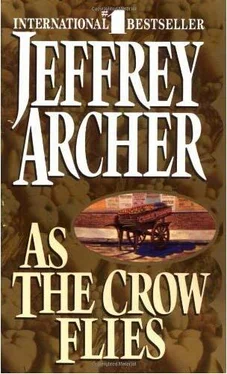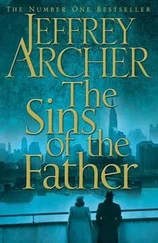After the dance was over I took Miss Salmon up to meet Elizabeth, who seemed equally enchanted. Later the memsahib told me that she had learned the girl was engaged to a Captain Trentham of the regiment, who was now serving in India. Trentham, Trentham . . . I remembered that there was a young officer in the battalion by that name—won an MC on the Marne—but there was something else about him that I couldn't immediately recall. Poor girl, I thought, because I had put Elizabeth through the same sort of ordeal when they posted me to Afghanistan in 1882. Lost an eye to those bloody Afghans and nearly lost the only woman I've ever loved at the same time. Still, it's bad form to marry before you're a captain—or after you're a major, for that matter.
On the way home, Elizabeth warned me that she had invited Miss Salmon and Trumper round to Gilston Road the following morning.
"Why?" I asked.
"It seems they have a proposition to put to you."
The next day they arrived at our little house in Tregunter Road even before the grandfather clock had finished chiming eleven and I settled them down in the drawing room before saying to Trumper, "So what's all this about, Sergeant?" He made no attempt to reply—it was Miss Salmon who turned out to be the spokesman for the two of them. Without a wasted word she set about presenting a most convincing case for my joining their little enterprise, in a non-executive capacity you understand, on a salary of one hundred pounds per annum. Although I didn't consider the proposition was quite up my street, I was touched by their confidence in me and promised I would give their proposal a great deal of thought. Indeed I said I would write to them and let them know my decision in the near future.
Elizabeth fully concurred with my judgment but felt the least I could do was conduct a little field reconnaissance of my own before I decided to finally turn down the offer.
For the next week I made sure I was somewhere in the vicinity of 147 Chelsea Terrace every working day. I quite often sat on a bench opposite the shop, from where without being seen I could watch how they went about their business. I chose different times of the day to carry out my observation, for obvious reasons. Sometimes I would appear first thing in the morning, at others during the busiest hour, then again perhaps later in the afternoon. On one occasion I even watched them close up for the day, when I quickly discovered that Sergeant Trumper was no clock-watcher: Number 147 turned out to be the last shop in the row to close its doors to the public. I don't mind telling you that both Trumper and Miss Salmon made a most favorable impression on me. A rare couple, I told Elizabeth after my final visit.
I had been sounded out some weeks before by the curator of the Imperial War Museum regarding an invitation to become a member of their council, but frankly Trumper's offer was the only other approach I'd received since hanging up my spurs the previous year. As the curator had made no reference to remuneration I assumed there wasn't any, and from the recent council papers they had sent me to browse through it looked as if their demands wouldn't exercise my time for more than about an hour a week.
After considerable soul-searching, a chat with Miss Daphne Harcourt-Browne and encouraging noises from Elizabeth—who didn't take to having me hanging about the house all hours of the day—I dropped Miss Salmon a note to let them know I was their man.
The following morning I discovered exactly what I had let myself in for when the aforementioned lady reappeared in Tregunter Road to brief me on my first assignment. Jolly good she was too, as thorough as any staff officer I ever had under my command, I can tell you.
Becky—she had told me that I should stop calling her "Miss Salmon" now that we were "partners"—said that I should treat our first visit to Child's of Fleet Street as a "dry run," because the fish she really wanted to land wasn't being lined up until the following week. That was when we would "move in for the kill." She kept using expressions I simply couldn't make head or tail of.
I can tell you that I came out in a muck sweat on the morning of our meeting with that first bank, and if the truth be known I nearly pulled out of the front line even before the order had been given to charge. Had it not been for the sight of those two expectant young faces waiting for me outside the bank I swear I might have withdrawn from the whole campaign.
Well, despite my misgivings, we walked out of the bank less than an hour later having successfully carried out our first sortie, and I think I can safely say, in all honesty, that I didn't let the side down. Not that I thought a lot of Hadlow, who struck me as an odd sort of cove, but then the Buffs were never what one might describe as a first-class outfit. More to the point, the damned man had never seen the whites of their eyes, which in my opinion always sorts a fellow out.
From that moment I kept a close eye on Trumper's activities, insisting on a weekly meeting at the shop so I could keep myself up to date on what was happening. I even felt able to offer the odd word of advice or encouragement from time to time. A fellow doesn't like to accept remuneration unless he feels he's pulling his weight.
To begin with, everything seemed to be going swimmingly. Then late in June of 1920 Trumper requested a private meeting. I knew he had got his eyes fixed on another establishment in Chelsea Terrace and the account was a bit stretched so I assumed that was what he wanted to discuss with me.
I agreed to visit Trumper at his flat, as he never appeared completely at ease whenever I invited him round to my club or to Tregunter Road. When I arrived that evening I found him in quite a state, and assumed something must have been troubling him at one of our three establishments, but he assured me that was not the case.
"Well, out with it then, Trumper," I said.
"It's not that easy, to be honest, sir," he replied, so I remained silent in the hope that it might help him relax and get whatever it was off his chest.
"It's Becky, sir," he blurted out eventually.
"First-class girl," I assured him.
"Yes, sir, I agree. But I'm afraid she's pregnant."
I confess that I had already learned this news some days before from Becky herself, but as I had given the lady my word not to tell anyone, including Charlie, I feigned surprise. Although I realize times have changed, I knew Becky had been strictly brought up and in any case she had never struck me as that sort of girl, if you know what I mean.
"Of course, you'll want to know who the father is," Charlie added.
"I had assumed—" I began, but Charlie immediately shook his head.
"Not me," he said. "I only wish it was. Then at least I could marry her and wouldn't have to bother you with the problem."
"Then who is the culprit?" I asked.
He hesitated before saying, "Guy Trentham, sir."
"Captain Trentham? But he's in India, if I remember correctly."
"That's right, sir. And I've had the devil's own job persuading Becky to write and let him know what's happened; she says it would only ruin his career."
"But not telling him could well ruin her whole life," I suggested testily. Just imagine the stigma of being an unmarried mother, not to mention having to bring up an illegitimate child. "In any case, Trentham's bound to find out eventually, don't you know."
"He may never learn the truth from Becky, and I certainly don't have the sort of influence that would make him do the decent thing."
"Are you holding anything else back about Trentham that I ought to know about, Trumper?"
"No, sir."
Trumper replied a little too quickly for me to be totally convinced.
"Then you'll have to leave the problem of Trentham to me," I told him. "Meanwhile you get on with running the shops. But be sure to let me know the moment it's all out in the open so I don't go around looking as if I haven't a clue what's going on." I rose to leave.
Читать дальше












